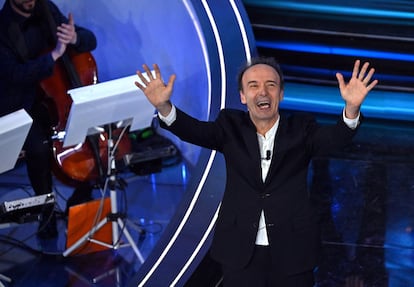Italy’s Sanremo festival shows its most contentious side, again
The highly politicized musical event has outdone itself this year with controversies over Zelenskiy, attacks against the Italian government and a defense of the Iranian protests. Could the end be near?

It’s the second night of the Sanremo Music Festival, the most famous Italian song contest and awards ceremony. Fedez, the rapper, pop singer and bombastic husband of influencer Chiara Ferragni, is on stage improvising a rap. Suddenly, he holds up a picture of Deputy Minister Galeazzo Bignami (a member of the prime minister’s right-wing Brothers of Italy party) wearing a Nazi uniform. “He won’t do anything,” said Fedez, who denounced the government for making too much fuss about certain singers’ festival appearances and defending people wearing swastika armbands.
The night before, Italian President Sergio Mattarella attended the festival and made a grand speech lauding the country’s constitution, followed by filmmaker Roberto Benigni’s sharply ironical comments. Then there was a controversy about Ukrainian President Volodymyr Zelenskyy’s recorded video message to the festival crowd, which apparently aggravated Deputy Prime Minister Matteo Salvini, head of the far-right Lega party. A festival spokesperson reportedly said, “If he doesn’t like it, he can go watch a movie.”
This year, the renowned music festival was at its most political and combative. It may be the last time the festival is presented on public television since political conservatives appear ready to take control of public broadcasting.
In its 73rd year, the Sanremo Music Festival has never been just an awards show. It is the center stage of Italian music and a highly sought-after recognition of achievement. All the greats have performed or won awards there. It is also Italian public television’s main event, the centerpiece around which programming executives plan the whole season. The show is wildly popular and captured a 63% viewing share this year.
But it is also a coveted political platform for those who know how to exploit it. Politicians who want to get a message out realize they must adapt it to the festival’s ambiance and glittery spotlight. The RAI, Italy’s national public broadcasting company, produces the annual event, which has become increasingly politicized in recent years. The RAI’s board of directors does not yet include a member from the Brothers of Italy political party.
The event began with a focus on Kyiv and the staunch Ukrainian war against Russian invaders. The organizers had invited Zelenskyy to record a video message for the January 7 opening (two days before he appeared before the European Parliament). But Deputy Prime Minister Matteo Salvini, who is also Minister of Infrastructure and Transportation, didn’t like the idea and stirred up a tiff. Salvini pressured the event organizers to cancel the video presentation, which ultimately devolved into a letter from Zelenskyy that will be read to the audience. Some local news sources reported that the festival’s decision not to broadcast the original video upset the Ukrainian president, casting a pall over the festival.
A surprise appearance
On the first day, President Sergio Mattarella made a surprise appearance, marking the first time that a head of state had attended the Sanremo Music Festival. Politicians protested that they weren’t informed in advance, but the festival’s producers said the secrecy was a security precaution requested by the president’s office. Mattarella then delivered a fiery speech about the country’s constitution that some interpreted as a warning to those in the government who want to hold a referendum on changing to a presidential system.
Roberto Benigni followed with a hard-hitting and hilarious monologue full of ironical allusions to the return of fascism and ulterior government motives. Needless to say, this greatly irritated Meloni’s party, which has frequently bemoaned the left’s appropriation of Italian cultural spaces. Still, seeing all these bitter adversaries join together to sing the national anthem on prime-time television was amusing.
Some performances also presented overt political messages. Tananai sang Tango, a real-life love story about a Ukrainian couple separated by war, while video clips of the couple played in the background. Longtime festival host and artistic director Amadeus made space for Iranian activist Pegah Moshir Pour to recite some of the lyrics of Baraye. Songwriter Shervin Hajipour used tweets about the protests in Iran for the lyrics, and the song has become the movement’s anthem.
Sanremo has always had a dose of politics – it’s all part of the fun. Benigni has excoriated prime ministers like Silvio Berlusconi on the festival stage more than a few times. Then there was the time journalist Giuliano Ferrara threw eggs at the television to protest something he didn’t like. But beyond all the political melodrama, the 73rd Sanremo Music Festival could be the end of an era.
Sign up for our weekly newsletter to get more English-language news coverage from EL PAÍS USA Edition
Tu suscripción se está usando en otro dispositivo
¿Quieres añadir otro usuario a tu suscripción?
Si continúas leyendo en este dispositivo, no se podrá leer en el otro.
FlechaTu suscripción se está usando en otro dispositivo y solo puedes acceder a EL PAÍS desde un dispositivo a la vez.
Si quieres compartir tu cuenta, cambia tu suscripción a la modalidad Premium, así podrás añadir otro usuario. Cada uno accederá con su propia cuenta de email, lo que os permitirá personalizar vuestra experiencia en EL PAÍS.
¿Tienes una suscripción de empresa? Accede aquí para contratar más cuentas.
En el caso de no saber quién está usando tu cuenta, te recomendamos cambiar tu contraseña aquí.
Si decides continuar compartiendo tu cuenta, este mensaje se mostrará en tu dispositivo y en el de la otra persona que está usando tu cuenta de forma indefinida, afectando a tu experiencia de lectura. Puedes consultar aquí los términos y condiciones de la suscripción digital.









































